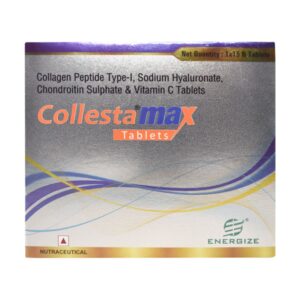VITAMIN C + COLLAGEN PEPTIDE + HYALURONATE
Vitamin C: Drug: Vitamin C
Use: Vitamin C is a water-soluble vitamin that is essential for the growth and repair of tissues in the body. It is used to prevent or treat vitamin C deficiency, scurvy, and to support the immune system. Additionally, it is sometimes used as an antioxidant to protect cells from damage.
Mechanism of Action: Vitamin C, also known as ascorbic acid, is involved in various biological processes in the body. It acts as a cofactor for enzymes involved in the synthesis of collagen, which is important for the health of connective tissues, skin, and blood vessels. It also enhances the absorption of iron from plant-based foods and helps the body to convert folate into its active form. Furthermore, vitamin C is a potent antioxidant that helps neutralize harmful free radicals and protect cells from oxidative stress.
Dose: The recommended daily allowance (RDA) of vitamin C varies based on age, sex, and life stage. For adults, the RDA ranges from 75-120 mg per day. However, higher doses are often used for specific conditions or situations, such as during pregnancy, breastfeeding, or during periods of increased stress or illness. Dosage recommendations can vary from person to person, so it’s important to consult with a healthcare professional for personalized advice.
Side Effects: Vitamin C is generally considered safe when taken in appropriate doses. However, excessive intake of vitamin C through supplements can lead to diarrhea, nausea, stomach cramps, or other gastrointestinal disturbances. Some individuals may also experience heartburn, headache, or insomnia. High doses of vitamin C can increase the risk of kidney stones in susceptible individuals. Additionally, individuals with certain medical conditions, such as kidney disorders or a history of kidney stones, should use caution and consult with a healthcare professional before taking high doses of vitamin C.
It’s important to note that vitamin C is widely available in fruits and vegetables, so a balanced diet can often provide adequate amounts of this vitamin. Dietary supplements should only be used when recommended or prescribed by a healthcare professional.
Collagen Peptide: Collagen Peptide is a dietary supplement that contains a specific type of protein called collagen. Collagen is the most abundant protein in the human body and provides structure and support to various tissues such as skin, tendons, ligaments, and bones.
The primary use of Collagen Peptide is to promote healthy and youthful-looking skin. It is commonly taken to improve the appearance of wrinkles, fine lines, and sagging skin. It may also help in strengthening hair and nails.
The mechanism of action of Collagen Peptide involves supplementing the body with collagen, which is broken down into smaller peptides during digestion. These peptides are then absorbed into the bloodstream and distributed to the skin and other tissues where they stimulate the production of new collagen. The increased collagen synthesis can improve skin elasticity and hydration.
The recommended dose of Collagen Peptide can vary depending on the brand and formulation. However, a typical dose is around 1-10 grams per day, usually taken orally as a powder or in capsule form. It is important to follow the instructions provided by the manufacturer or consult a healthcare professional for the appropriate dosage.
Collagen Peptide is generally considered safe for most people when taken orally in the recommended doses. However, some individuals may experience mild side effects such as gastrointestinal disturbances, including bloating, diarrhea, or constipation. It is advisable to start with a lower dose and gradually increase it to allow the body to adjust. In rare cases, allergic reactions or hypersensitivity to collagen peptides may occur. If any adverse effects are experienced, it is recommended to discontinue use and consult a healthcare professional.
Hyaluronate: Hyaluronate, also known as hyaluronic acid, is a naturally occurring substance found in the body. It is a glycosaminoglycan, a type of molecule that helps provide lubrication and cushioning in the joints and other tissues.
Hyaluronate is commonly used as a medical treatment for joint disorders, such as osteoarthritis. It can be injected directly into the affected joint to provide relief from pain, inflammation, and stiffness. It is particularly effective in treating knee osteoarthritis.
The mechanism of action of hyaluronate is not fully understood, but it is believed to have several beneficial effects. It helps to increase viscosity and elasticity of the synovial fluid in the joint, providing better lubrication and shock absorption. It also has anti-inflammatory properties and may help stimulate the production of natural hyaluronic acid in the joint.
The dose of hyaluronate can vary depending on the specific product used and the severity of the condition being treated. Typically, a series of injections is given over several weeks, with a usual dose of 20 to 30 milligrams per week. The injections are administered by a healthcare professional directly into the affected joint.
As with any medication, hyaluronate can have side effects. Common side effects include pain, swelling, or redness at the injection site. Some people may experience allergic reactions, such as hives or difficulty breathing. In rare cases, infection or bleeding at the injection site can occur. It is important to discuss any concerns or potential side effects with a healthcare provider before starting treatment with hyaluronate.

